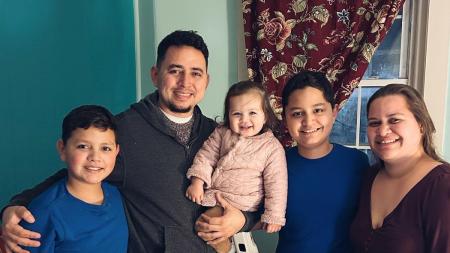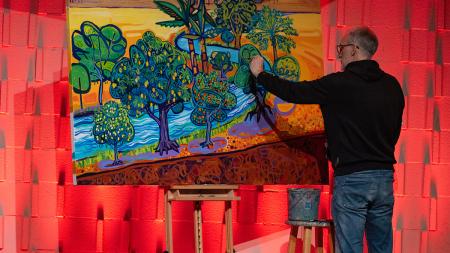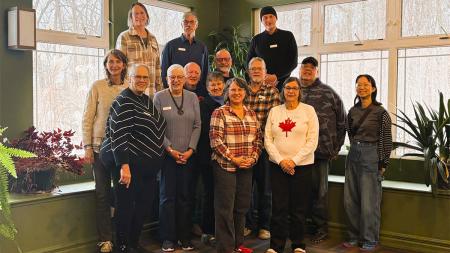City Seminary in New York City Reaches a Milestone

Weekly noon prayer at City Seminary
Members of the Mission Innovation Team (MIT) for Resonate Global Mission met at City Seminary in Harlem, New York, for four days recently to discuss ways to approach ministry in North America and around the world, following last year’s unification of Christian Reformed Home Missions and Christian Reformed World Missions. This is the first in a series of stories that CRC Communications will publish about ministries and individuals with whom team members met to discern how ministry takes place in a large urban setting.
After a long process, Mark Gornik, a Christian Reformed pastor and director of City Seminary in Harlem, New York, and Maria Liu Wong, dean of the seminary, were recently able to welcome the first class of students to study in the school’s new Master of Arts in Ministry in the Global City program.
Nearly 20 students from across the New York City area were on hand for the orientation, which took place on the evening of Jan. 18 in a spacious, brightly lit room of the seminary.
“This is a gift from God. We have waited a long time. To offer this degree will help us to keep responding to what God is doing in the city,” said Gornik, coauthor with Liu Wong of the recently released book Stay in the City.
In the book, Gornik and Liu Wong offer stories of the pastors, leaders, and churches, especially those from Asia, Africa, and Latin America, who have helped to shape City Seminary before and since it was launched in 2003.
“City Seminary puts an urban lens on the whole of theological learning,” Gornik and Liu Wong write. “Amidst the fast pace of urban life, we seek to slow down, in one neighborhood at a time, to bring our faith journeys together and to learn the practices of ministry in context.”
Seeing God at Work in the City
Gornik said that getting to the point where City Seminary can offer its own degree has been a long, evolving process. In fact, starting a seminary wasn’t on his mind when Gornik came from Baltimore, Md., to New York City in 1998 to help plant a church in Harlem.
In Baltimore he began a church and did community development work in the poverty-stricken Sandtown area for over a decade.
“When we moved here to start a similar ministry, many buildings in this Harlem neighborhood were abandoned,” said Gornik.
But not long after arriving in Harlem, Gornik became aware of the multiplicity of churches in Harlem and across New York City.
As part of his work on a Ph.D. in world Christianity from the University of Edinburgh, Scotland, he learned – along with the help of church historian and missions expert Andrew Walls -- more about the many churches begun in New York City by immigrants from such countries as Nigeria, Uganda, India, China, Guatemala, and Mexico.
Eventually he published a book on what he was learning, World Made Global: Stories of African Christianity in New York City, which was named the Missions/Global Affairs book of the year by Christianity Today in 2012.
“We learned that there was a great opportunity for a different way of doing theological education,” said Gornik.
A Tough Road
Gornik began the seminary with a handful of students in the hallway of a church basement. Having a vision of training leaders of urban congregations, with many ministering in warehouses, storefronts, and homes, seemed like an idea that could support and encourage the life of faith in the city, he said.
With the help of Sue Baker and Manny Ortiz from Spirit and Truth Fellowship, a CRC congregation in Philadelphia, Pa., the work grew.
Early on, the seminary partnered with Westminster Theological Seminary in Glenside, Pa., to offer a master’s degree through that school, from which Gornik graduated and where Ortiz was a professor of urban mission.
“We started to build up a citywide learning community. It was and is incremental work,” he said.
In 2005 the seminary moved out of a church basement and into a Harlem storefront. Building relationships in the area, they were able to partner with a developer who in 2010 constructed the building in which the seminary is now located, occupying a 10,000-square-foot space on one floor.
In 2009 the seminary received a grant from Lilly Endowment Inc. to help start the Ministry Fellows program, now an intensive four-month course of study that has attracted students from many nationalities, church backgrounds, and traditions.
Students enrolled in the program may have theology degrees, while others may come from Bible institutes or church-based training, and still others may not have had any formal training.
Some have gone on to plant churches, in the city and elsewhere, while others have stayed at the churches where they are. Many remain working in different jobs, not just to pay their bills but also as a place of ministry.
“City Seminary is a place that comes from the heart,” said Kevin Schutte, leader of Resonate’s church planting team and also a member of the Mission Innovation Team that met at the seminary. “This is mission innovation right here. God’s presence is evident.”
Reaching the Goal
Word came late last year that the New York State Department of Education had approved City Seminary to grant a 39-credit Master of Arts degree in “Ministry in the Global City.”
Among other things, the new master’s degree focuses on giving students a deepened sense of vocation to ministry in the city; provides tools and practices helping students to become adaptive for ministry and leadership in the city; and helps students develop in spiritual formation grounded in Scripture, prayer and community, and the use of the arts.
Woven throughout the curriculum is an approach to ministry in the city filled with grace and the saving action of the Spirit of God.
“With the city as the classroom and as the focus of every course,” said Gornik, “students are being prepared for the challenges of living and thinking theologically in a growing and changing, increasingly diverse global Christian church.”
But even now that they are approved to grant a degree, the City Seminary’s mission remains the same -- and, if nothing else, will deepen, said Gornik.
“Our approach has always been to encourage people to listen to their communities,” he said. “At City Seminary, we affirm each other’s theological traditions. We need to be aware of the diversity that is defining and changing the church in this country.”
Miriam Acevedo is now director of operations at the seminary. She grew up in Harlem and the Bronx and worked for many years in community health care. She was attracted by the seminary’s open approach to learning and went through the Ministry Fellows program.
“I am so grateful for the new master’s program so that others can join in what we do,” she said. “Prayer is our model. We wait on God and don’t go before God.”
Besides working at the seminary, Acevedo is an active member of Damascus Christian Church of Hunts Point, part of a Latino Pentecostal movement. Serving her church in children’s ministry, as treasurer, as a licensed minister, and as a church council member, she is able, she said, to use skills and knowledge she gained at City Seminary.
“We can take what we learn here back to our neighborhoods,” she said. “In so many ways, City Seminary is about more than I can express. We are a community where we can freely share our gifts.”


